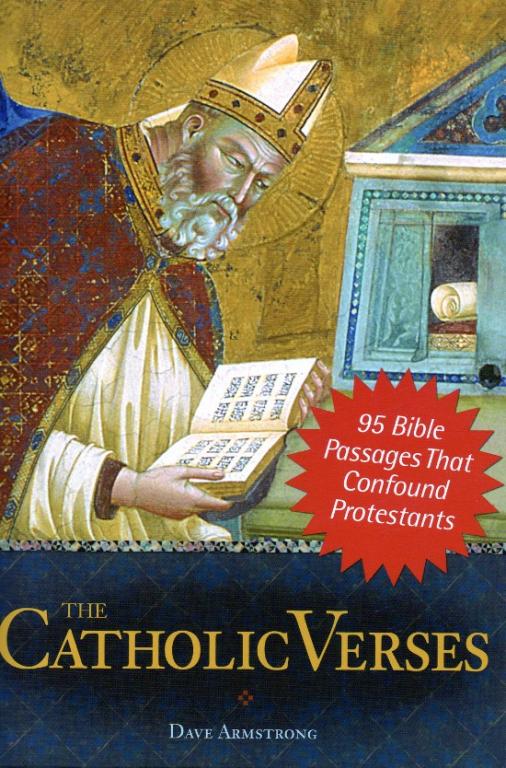
This is from my book, The Catholic Verses (Sophia Institute Press, 2004, pp. 63-68).
*****
James 2:24:“You see that a man is justified by works and not by faith alone” (cf. 1:22, 2:14, 17, 20, 22, 26).
Catholics believe in an organic relationship between faith and works. Far from being intractably opposed to one another, they are in fact inseparable. Faith is necessary to produce truly good works, and works in turn are the evidence of a true faith. This verse would appear, on the other hand, to present a problem for the fundamental Protestant notion of sola fide, or faith alone. The Bible here expresses precisely the opposite proposition: one is not justified by faith alone.
Much of the Protestant polemic historically has been oriented toward “faith alone,” and a false charge that the Catholic Church asserts salvation through works. It is no small wonder, then, that verses such as this one make Protestants squirm. Protestants must provide an explanation for this verse and related ones that escapes the straightforward, literal meaning.
We can be fairly sure that if the passage had stated the opposite — “a man is justified by faith alone,” an idea that never appears in a single verse in Holy Scripture, nor is it taught in the Bible as a whole — it would have been one of the centerpieces of the Protestant apologetic. But since the verse flatly contradicts one of their major premises, Protestants are forced to come up with tortured explanations or else ignore it altogether.
The common Protestant reply to James 2:24 (and the book of James in general) is to say that a different sense of the word justified is being employed by St. James. He is referring to the fruit of justification and the merely outward indication that one is saved. Catholics, on the other hand, follow St. Augustine’s understanding of merit:
What merit of man is there before grace by which he can achieve grace, as only grace works every one of our good merits in us, and as God, when He crowns our merits, crowns nothing else but His own gifts? (Ep. 194, 5, 19; in Ott, 265).
But these two clashing approaches to justification have a substantial meeting point: both accept the notion of sola gratia, or salvation by grace alone (over against the heresy of Pelagianism, which holds that man can be saved by works or his own self-generated effort). Both also believe that good works are necessary in the Christian life.
Catholics believe that faith and works are more closely tied together, and related to justification itself. Works can follow only by God’s grace and do not cause salvation, but they must be present, because (per James), “faith apart from works is dead” (James 2:26).
In large part, the Protestant-Catholic dispute is over the distinction between justification (that is, salvation) and sanctification (holiness). Protestants believe that the latter has nothing whatsoever to do with justification (which is imputed to the believer or declared by God), yet that it should follow from it. Catholics think they are closely related. The practical result is arguably the same in either system.
Classical Protestantism will not accept a person as “saved” if that person shows no fruit of good works in his life. They will deny that he ever was saved if he habitually engages in serious sin. Both Luther and Calvin taught this. Luther wrote (contrary to much Evangelical talk today):
We must therefore certainly maintain that where there is no faith there also can be no good works; and conversely, that there is no faith where there are no good works. Therefore faith and good works should be so closely joined together that the essence of the entire Christian life consists in both (in Althaus, 246).
Accordingly, if good works do not follow, it is certain that this faith in Christ does not dwell in our heart, but dead faith (in Althaus, 246; also LW, 34, 111; cf. 34, 161).
St. James is emphasizing the works element of salvation, and St. Paul, the faith element. But neither denies the other element (see in Paul, e.g., Rom. 2:5-13; 1 Cor. 3:8-9; Eph. 2:10; Titus 3:8). Neither James nor Paul compartmentalizes works and faith into distinct theological constructs of “sanctification” and “justification.” Rather, what is seen here is an organic unity, precisely as in the Catholic view.
But many Protestants whom I have come across think that the Bible distinguishes here between justification before God and justification before men. Their argument hinges on a different sense of justification in James compared with the rest of Holy Scripture.
Catholics believe that salvation is an ongoing endeavor, not a one-time event, as Protestants think (see, e.g., 1 Cor. 9:27, 10:12; Phil. 2:12-13, 3:11-14; Heb. 3:12-14). Obviously, if it were an instantaneous event, there would be no time for works at all, so works are irrelevant and meaningless in any discussion of justification in that sense. James is discussing justification-in-process. Ironically, Luther himself seemed to believe in ongoing justification:
Our justification is not yet finished. It is in the process of being made; it is neither something which is actually completed nor is it essentially present. It is still under construction (in Althaus, 245).
On the other hand, at certain points in his life, Luther was willing to disavow the canonicity of James. Paul Althaus noted how Luther believed that even some passages in the Bible cease to “have the authority of the word of God” if they “cannot be unified with the witness of all the rest of Scripture.” Thus, Luther wrote in 1543, three years before his death:
Away with James. . . . His authority is not great enough to cause me to abandon the doctrine of faith and to deviate from the authority of the other apostles and the entire Scripture (in Althaus, 81).
The year before, Luther had written:
Up to this point I have been accustomed to deal with and interpret [James] according to the sense of the rest of Scripture. For you will judge that none of it must be set forth contrary to manifest Holy Scripture. Accordingly, if they will not agree to my interpretations, then I shall make rubble of it. I almost feel like throwing Jimmy into the stove (in Althaus, 81; LW, 34, 317).
In his preface to the New Testament, written in 1522, Luther famously described James as “an epistle of straw” (see Bainton, 259). He did not consider it the true writing of an apostle (even in 1545, the year before his death). In his revised version of his preface to the book, he stated that it taught works-righteousness, “rends” the Scripture, and “resists” St. Paul.
Luther was equally strident when defending his addition of the word alone after faith in Romans 3:28:
Thus I will have it, thus I order it, my will is reason enough…. Luther will have it so, and . . . he is a Doctor above all Doctors in the whole of Popery (in O’Connor, 25; Letter to Wenceslaus Link in 1530).
Obviously, if the book of James did not make Protestants (perhaps Luther, above all) squirm, they would not be led to adopt such desperate measures and arguments to explain it (away, as it were). Thus, I once had an Internet dialogue with a person who constructed his entire exegetical argument from James’s use of the word see in this verse. He reasoned that James was referring simply to outward manifestations of true saving faith, which came by faith alone, because this was what other human beings could see.
I doubt that this is a very common Protestant interpretation of the verse, especially among scholars, but it does in any event illustrate the extent to which even thoughtful, intelligent Protestants (and this person was pretty sharp) will go to explain the difficult passages of James that seem to contradict their theology.
This argument (and, more important, the sophisticated version of it that does not depend on the words “you see”) collapses utterly, however, in light of a rather simple contextual consideration. James 2:21, three verses before, reads, “Was not Abraham our father justified by works, when he offered his son Isaac upon the altar?” This justification was not “before men,” but before the Lord. Yet Scripture teaches us that Abraham was justified in that very act, even though no other human being was around to see it.
That is not to say that his faith was not important. His act of obedience displayed great faith — a faith inseparably united with his actions. In fact, the very next verse (James 2:22) gives us exactly this authoritative interpretation: “You see that faith was active along with his works, and faith was completed by works.” The real clincher, however, comes in verse 2:23: “and the scripture was fulfilled which says, ‘Abraham believed God, and it was reckoned to him as righteousness.’ ” Note what has occurred here. If the fulfillment of Abraham’s “faith alone” act of “believing in God” came via a work, which no one else saw, two things logically follow:
- Faith and works are shown once again to be two sides of a coin. They cannot be, and should not be, separated. St. Paul’s “belief reckoned as righteousness” is grounded in a work, and authoritatively so, since one apostle interprets the same passage that another has interpreted, based on an Old Testament passage. Inspired — God-breathed — Scripture cannot contradict itself.
- The Protestant “faith alone” concept that is built upon the Abrahamic verses having to do with faith, among others, cannot possibly be interpreted as excluding works altogether (that is, from justification). It simply cannot be done.
*
In popular Protestant understanding, the radical dichotomy of “faith versus works” largely dominates. This is unbiblical, as I think can be demonstrated in the commentary above and in a close examination of related passages such as those that follow.
Sources
Paul Althaus, The Theology of Martin Luther. Translated by Robert C. Schultz. Philadelphia: Fortress Press, 1966.
Roland H. Bainton, Here I Stand. New York: Mentor Books, 1950.
Martin Luther, Luther’s Works (LW). American edition. Edited by Jaroslav Pelikan (vols. 1-30) and Helmut T. Lehmann (vols. 31-55). St. Louis: Concordia Pub. House (vols. 1-30); Philadelphia: Fortress Press (vols. 31-55), 1955.
Henry O’Connor, Luther’s Own Statements. 3rd ed. New York: Benziger Bros., 1884.
Ludwig Ott, Fundamentals of Catholic Dogma. Translated by Patrick Lynch. Edited by James Canon Bastible. 4th edition in English. Rockford, Illinois: TAN Books, reprinted in 1974.
*****













